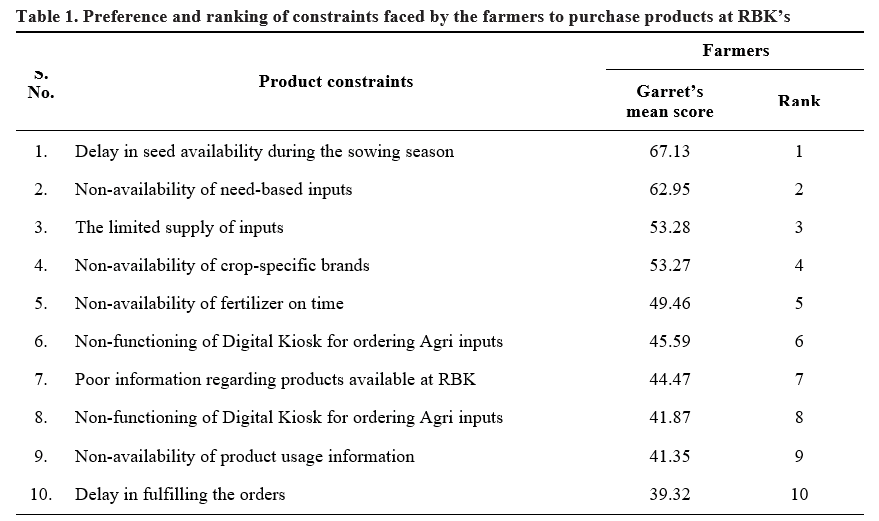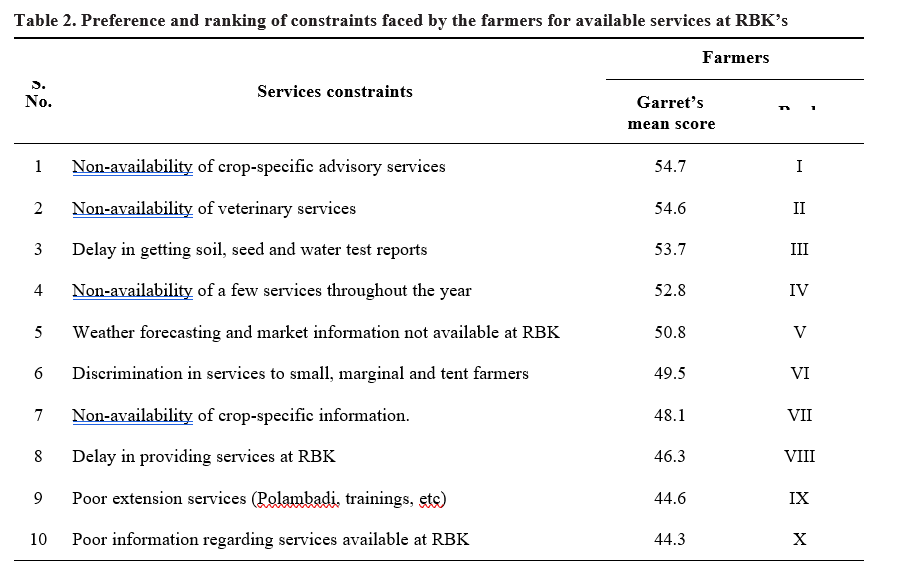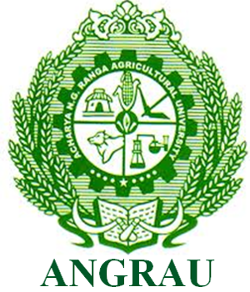A Study on Constraints and Suggestions About Rythu Bharosa Kendras (Rbks) Products and Services by the Beneficiary Farmers In the Prakasam District of Andhra Pradesh
0 Views
K. ANANTHA DAMODARA REDDY*, P. BALA HUSSAIN REDDY, V. SAILAJA AND SHAIK NAFEEZ UMAR
Institute of Agribusiness Management, S.V. Agricultural College, ANGRAU, Tirupati-517 502.
ABSTRACT
The present study was conducted to analyze the constraints faced by the farmers while using the products offered by Rythu Bharosa Kendra’s (RBKs) particularly in the Prakasam district of Andhra Pradesh. 120 farmers from six RBKs were purposively chosen for the study from six villages and randomly selected and interviewed. The results of the study indicated that the sample farmers faced constraints mainly with the statements delay in seed availability during the sowing season, non-availability of need-based inputs. The limited supply of inputs, non-availability of crop-specific brands, non-functioning of the digital kiosk for ordering agri inputs having Garret’s mean score of 67.13, 62.95, 53.28, 53.27, 49.46 and 45.59, respectively.
KEYWORDS: Rythu Bharosa Kendra (RBK), Constraints, Garret’s Ranking, Farmers.
INTRODUCTION
Agriculture plays an important role in the Indian economy. The rural population in India was reported at 65.07 per cent in 2020 where more than 70 per cent of rural households depend on agriculture and allied sectors and account for ` 19.48 lakh crores of the country’s Gross Value Added (GVA) (Department of Agriculture, Cooperation & Famers Welfare, 2020-21). About 51 per cent of geographical land is under cultivation which shows that agriculture plays an important role in the Indian economy. Whereas, the cropping intensity has increased by 25 per cent after the independence to about 136 per cent (DES, DAC & FW, 2016). India has emerged from a stage of food deficit to food surplus. India is the world’s second-largest producer of rice, wheat, and other cereals. India is exporting cereal products due to the huge demand for cereals in the global market. In FY 2021 food grain production was recorded at 303.34 million tonnes. India ranks second in fruits and vegetable production in the world. Total horticulture production is estimated to be 331.05 million metric tonnes in 2020-21 (APEDA, 2020).
The Andhra Pradesh government launched Rythu Bharosa Kendras (RBK) for the farmers as one-stop solution for all agriculture and allied firms’ products and services on May 30, 2020. RBK is a one-stop solution for all farm needs at the village level only. These RBKs are monitored jointly by the Department of Agriculture, Horticulture, AP Seeds, Sericulture, Fisheries, and Animal husbandry. The newly formed RBKs have digital kiosks and apps to assist the farmers in buying the Agri inputs like seeds, fertilizers, pesticides, livestock feeds, and veterinary medicine and the staff will deliver the product at an accurate time for the market price. After placing an order, it takes 48 hours to reach the farmer. RBKs prevent the middleman and spurious goods. An integrated call center has been established to address the problems and give solutions to them. With this call center, the farmers get the solution for their problems and the government also knows what type of problems are being faced by the farmers.
Value-added services like the “Rythu-Bharosa- welfare scheme” an input subsidy scheme has been introduced for providing financial support to purchase input products. Through this scheme, 50.58 lakh farmers families benefitted amount of ` 1036 crores by the Andhra Pradesh government (2022). Another valve-added service is “e-crop booking”. It is all about documenting the farming land to get free crop insurance for the farmers. “Polam-Badi” is an extension program where farmers are trained in the field about minimum usage of inputs and getting maximum output and reducing the cost of cultivation. Weather forecasting and market information related to agriculture and allied sectors are also available at RBKs. Registration for tenant farmer’s service is also offered by RBKs at the farm gate.
RBKs are also acting as procurement centers and giving assurance to farmers for getting MSP for their products. RBKs are also providing the soil testing service.
MATERIAL AND METHODS
The study was conducted in the Prakasam district
of Andhra Pradesh during the second quarter of 2022- 23 Out of thirteen mandals in the Markapur revenue division of the Prakasam district, two mandals were selected randomly namely Giddaluru and Komarolu for the study. Three villages were selected purposively from each mandals having the highest number of farmers. The villages selected from the Giddalur Mandal were Munlapadu, Yellupalli and Ambavaram and from Komarolu Mandal were Balireddypalle, Pursohampalle and Thatireddypalle. A total of six villages having RBKs were purposively chosen for the study. Twenty beneficiary farmers were randomly selected from each of the RBKs of that particular village for the survey thus making the total sample size 120 farmers for the analysis of the statements, Garret’s ranking technique was used. It is used to set the priorities or rank the level of information sources available on a general statement while purchasing the products at the RBKs. The formula used for this technique is

Rij = rank given for ith factor by jth individual
Nj = number of factors ranked by jth individual
RESULTS AND DISCUSSION
The data regarding the constraints faced by the sample farmers towards the purchase of products at Rythu Bharosa Kendras were collected and analyzed using Garrett Ranking technique and presented below in the Table 1.
Table 1 showed the farmer’s preference for the severity of constraints they faced while purchasing products at Rythu Bharosa Kendras were ranked by using the Garrett score in the order of preference: Delay in seed availability during the sowing season (Rank1), Non-availability of need-based inputs (Rank 2), Limited supply of inputs (Rank 3), Non-availability of crop- specific brands (Ranks 4) With Garrett’s mean scores of 67.13, 62.95, 53.28, 53.27 respectively. Delaying in


| fulfilling the order and non-availability of product usage purchasing products | from RBKs | such as the | non- |
information are the least product purchase constraints faced by the sample farmers at RBKs with Garret’s Mean scores of 39.32 and 41.35 respectively.
Table 2 shows the preference for major constraints faced by farmers to avail services at Rythu Bharosa Kendras a non-availability of crop-specific advisory services (Ranks1), non-availability of veterinary services (Rank 2), delay in getting soil and water report (Rank 3), non-availability of few services thought out the year (Rank 4) with Garrett’s mean scores of 54.7, 54.6, 53.7,
52.8. Poor extension services and information regarding services available at RBK are the constraints having Garrett’s mean scores of 44.6 and 44.3 respectively. Constraints like non-availability of crop-specific advisory services and the non-availability of veterinary services were perceived to be poor extension services and information regarding the services available at RBK were considered the least ranked constraints indicating that there were severe constraints regarding the statements.
Suggestions expressed by the farmers to overcome the problem in availability of products at the RBKs
Farmers experienced substantial constraints while availability of need-based inputs, the non-availability of Agri inputs on time and the limited supply of inputs. is recommended that each RBK develop a crop-specific pre-monsoon order plan, taking into consideration cropping patterns from the previous two years, cropping area and major pests and diseases.
In order to identify the specific inputs that are needed in the region, it is advisable to place orders well in advance and maintain stocks at a minimum of 80 percent of the previous year’s average annual usage. To accommodate for seasonal fluctuations in demand, it is recommended to review and adjust the order quantities after the monsoon season. Farmers face significant challenges in accessing essential services, including a lack of crop-specific advisory support and veterinary services. Additionally, there are delays in receiving results for soil, seed, and water tests. To address these issues, it is suggested that each RBKs develop and regularly update a database specific to various crops. Furthermore, staff should receive training in providing crop-specific advisory services, and technical personnel should be provided access to a mobile-based crop assessment tool to enhance the quality of these advisory services.
To further improve income for rural farm households engaged in secondary activities like animal husbandry, it is recommended to offer veterinary assistance services at all RBKs. This initiative would contribute to augmenting their income sources. These findings are in the line with the work of Murthy (2000).
Provide more crop-specific chemicals and also water-soluble fertilizers because the sample farmers in the study adopted micro-irrigation which is useful for fertigation.
Significant constraints faced by farmers at RBKs were problems in non-availability of updated land records, delay in seed availability during the sowing season, non-availability of need-based inputs and fertilizer on time. To overcome the above constraints farmers may be able to know about the advantages of more products and services. More subsidies for fertilizers and seeds providing crop-specific chemicals for enhancing production and profitability and the supply of subsidized farm machinery were significant suggestions of farmers for improving the reach of RBK interventions to farm households in Andhra Pradesh.
ACKNOWLEDGMENT
I am very much grateful to the Institute of Agribusiness Management, Tirupati for the financial assistance provided in the form of a stipend during my post-graduate studies.
LITERATURE CITED
Annual Report 2020-21. Department of Agriculture, Cooperation & Farmers’ Welfare. www.agricoop. nic.in
Anonymous, 2021. Rural population in India. The World Bank. https://data.worldbank.org
Anonymous, 2022. Andhra Pradesh’s GSDP to register record growth rate in 2021-22: Socio-Economic Survey. https://timesofindia.indiatimes.com
Gaikwad, B.H and Gunjal, S.S. 2000. Constraints faced and suggestions made to improve activities of Krishi Vigyan Kendra in Maharashtra. Indian Farming. 49(2): 34-35
Garret, H.E and Woodworth, R.S. 1969. Statistics in Psychology and Education. Vakils, Feffer and Simons Pvt. Ltd., Bombay. pp:329.
Meena, B.S and Baldeo, S. 2013. Perceived constraints and suggestions for effective functioning of Krishi Vigyan Kendras, Agricultural Update. 8(3): 330-335.
Murthy, V.S. 2000. A study on Janmabhoomi program in Chittoor district of Andhra Pradesh. M.Sc. (Ag). Thesis. Acharya N.G. Ranga Agricultural University, Hyderabad, India.
- Genetic Divergence Studies for Yield and Its Component Traits in Groundnut (Arachis Hypogaea L.)
- Correlation and Path Coefficient Analysis Among Early Clones Of Sugarcane (Saccharum Spp.)
- Character Association and Path Coefficient Analysis in Tomato (Solanum Lycopersicum L.)
- Survey on the Incidence of Sesame Leafhopper and Phyllody in Major Growing Districts of Southern Zone of Andhra Pradesh, India
- Effect of Organic Manures, Chemical and Biofertilizers on Potassium Use Efficiency in Groundnut
- A Study on Growth Pattern of Red Chilli in India and Andhra Pradesh

